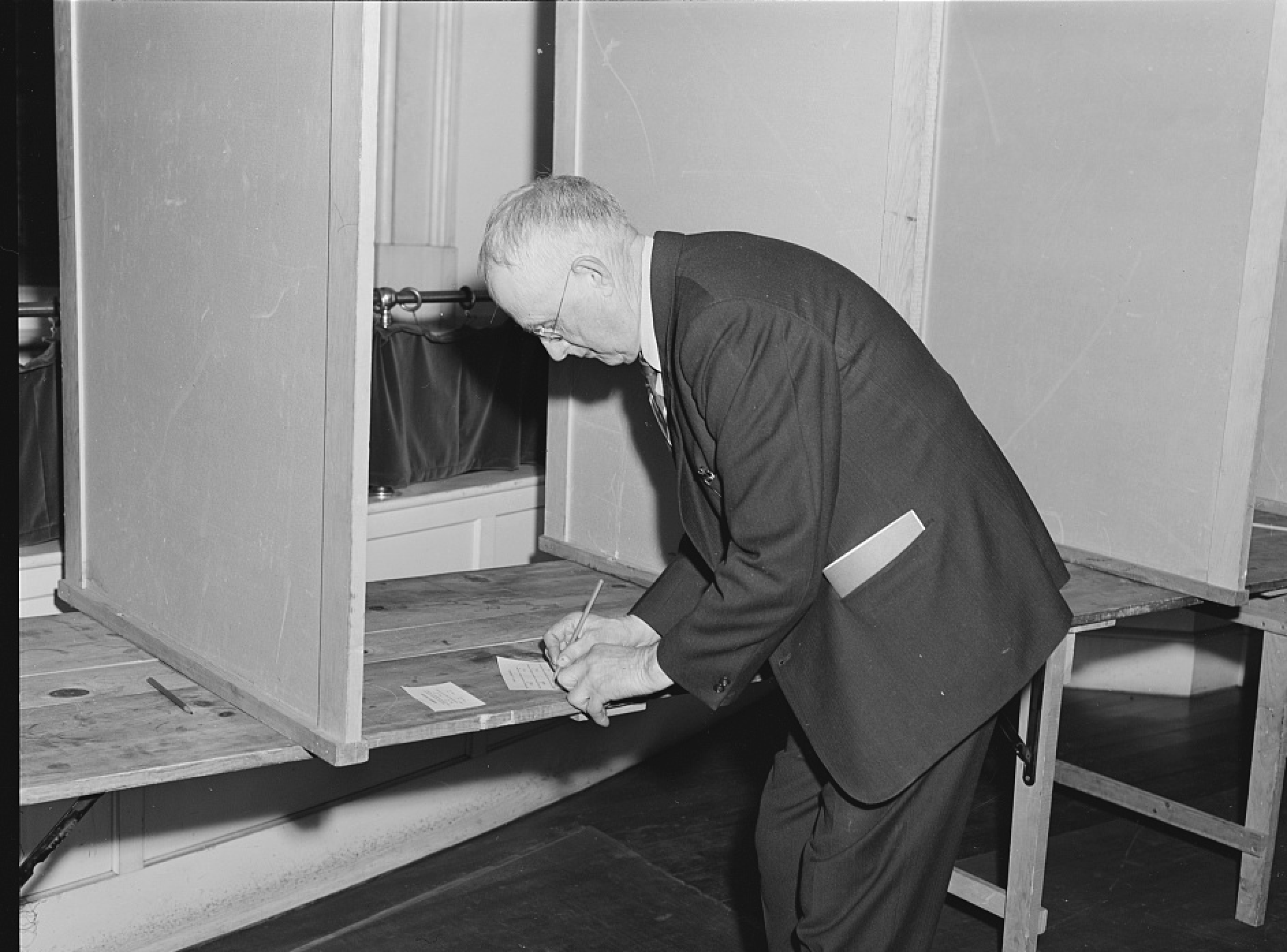Town Meeting 1940 in Pictures: When the Issue of the Day was Intoxicating Liquors
By Jennie Shurtleff
In March of 1940, a young photographer named Marion Post Wolcott came to Woodstock. Although only a brief stop on her tour through rural America, she took many iconic photographs that still are widely circulated in both digital and print media.
Marion was born into a family of privilege and spent her early years in New Jersey. After her parents divorced, she was sent to boarding school. She later went to Europe, where her sister was studying photography under Trude Fleischmann, a well-known society and fashion photographer. Like her sister, Marion started taking photographs, and when Fleischmann saw her work, she encouraged Marion to continue with her photography.
Marion Post Wolcott, photographer for the FSA. Library of Congress. fsa.8c30938
As World War II accelerated in Europe, Marion and her sister returned to the United States. Marion joined the New York Photo League, and her work caught the attention of several prominent members who, in turn, showed her work to the head of the Farm Security Administration’s photography division, Roy Stryker. Stryker immediately hired Marion, and thus began her journey of documenting rural America in the early 1940s.
While visiting Woodstock, Marion took photographs of various farms, including the Gilbert’s farm on Route 12 North and Maple Valley Farm in North Bridgewater. She also photographed people working in the village, doing jobs ranging from collecting garbage to working in the town offices.
Since she was here during the month of March, she was able to document Town Meeting Day. Her photos capture the essence of this special event in which townspeople are allowed to freely voice their opinions and vote on the issues that affect their lives. In 1940, the big issue of the day was whether or not intoxicating liquors should be sold in local stores.
Below are some photographs from Town Meeting Day, 1940, in Woodstock. Today, Marion Post Wolcott's work is archived at the Library of Congress.
This photo of Town Meeting Day in 1940 shows that there was plenty of snow that year. The snow, however, didn’t dampen participation, as people still turned out in droves to cast their votes. Photo by Marion Post Wolcott. Courtesy of the Library of Congress. LC-USF34- 053311-D [P&P]
The Town Treasurer in his office on Town Meeting Day. It appears that he’s doing a few last minute calculations (or perhaps pretending to do some last minute calculations as he poses for the pretty young photographer). Photo by Marion Post Wolcott. Courtesy of the Library of Congress. LC-USF34- 053332-D [P&P]
One of Woodstock’s selectmen voting on whether intoxicating liquors should be sold. Photo by Marion Post Wolcott. Courtesy of the Library of Congress. LC-USF34-053330-D
The selectman takes his vote to the ballot box. According to Marion’s caption on this photo, the woman who gave him the ballot at Town Meeting said, "If you vote yes for liquor, you'd better put your ballot in a box in a different town. We won't let you stay around here long."
Hmmm. That’s not quite how democracy is supposed to work.
Woodstock, Vermont. LC-USF346- 053351-D [P&P]
Above a group of voters walk past after depositing their votes in the ballot box (at the front of the auditorium, near the stage). One wonders if the woman handing out ballots also “suggested” to them how they should vote on the all-important issue of intoxicating liquors. Photo by Marion Post Wolcott. Courtesy of the Library of Congress. LC-USF34- 053262-D [P&P]
Another important vote in 1940 was whether pinball machines should be taxed. Look at the countenances of these folks. How do you think that vote will go? Photo by Marion Post Wolcott. Courtesy of the Library of Congress. LC-USF34- 053353-D [P&P]
In addition to discussing alcohol and pinball machines, there was also a report from John G. Foster, the overseer of the poor, who discussed the families who receive charity from the town. Apparently, not one to mince words, he described one of the recipients of the town funds as a "miserable cuss" because he had left his wife and children on Christmas day without any food or fuel and spent what little money he had on liquor and women. Photo by Marion Post Wolcott. Courtesy of the Library of Congress. LC-USF34-053268-D
Above is the former sheriff of Woodstock, Vermont, “guarding” the ballot boxes while he eats his lunch during town meeting noon recess. Photo by Marion Post Wolcott. Courtesy of the Library of Congress. LC-USF34- 053249-D [P&P]
Back in the day when indoor smoking was allowed, the noon-time recess was the perfect time for a quick smoke to take the edge off the pressures of the day. Photo by Marion Post Wolcott. Courtesy of the Library of Congress. LC-USF347- 053254-D [P&P]
At a quick glance, it looks like poker night with the “boys” counting up their winnings, but no! These men are hard at work counting the votes from Town Meeting. Photo by Marion Post Wolcott. Courtesy of the Library of Congress. LC-USF34-053255-D
According to the Vermont Standard (March 7, 1940, page 4), the outcomes of the day after the votes were tallied were:
The town did not have the authority to impose a tax on pinball machines, so the matter was tabled. However, the “majority of opinion concerning the matter was to the effect that such machines are of no benefit to the community, several voters desiring to have them abolished. The town’s listers were encourage to tax them to their limit.”
“The poor department was headed for an appropriation of thirty cents when John G. Foster, overseer of the poor, took the floor to explain some of the conditions among his clientele. Mr. Foster stated some of his younger dependents were not worthy of support, but that when the heads of the families left home, there was nothing he could do but give aid to their wives and children. He stated he was not anxious to spend the town’s money, but that certain situations compelled him to undergo expense. Mr. Foster’s explanation of his department was so effective that a thirty-five cent appropriation passed.”
“The vote on article 12 was as follows: shall baseball be permitted on Sunday in this town, yes 218, no 30; shall moving pictures be permitted in this town on Sunday, yes 217, no 26; shall lectures and concerts be permitted in this town on Sunday, yes 230, no 13.
The vote on article 16 was as follows: shall spirituous liquors be sold in town, yes 171, no 76; shall license for sale of malt and vinous beverages be granted in town, yes 188, no 61; the vote on these questions, as well as those in the above paragraph, were by ballot.”
Based on the votes for article 16, it looks like the harried selectman we saw above was probably allowed to stay in town, even if he did vote “yes” in favor of selling intoxicating liquors, as he would have been in the majority for that particular vote.
Thus ends the Town Meeting of 1940 in Woodstock.











